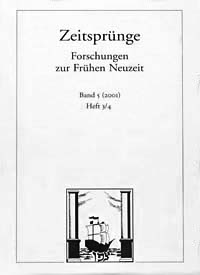
Petra Schaper-Rinkel (2004). Technik, Wissen und Macht in Utopien und Zukunftsvorstellungen der Frühen Neuzeit. In: Zeitsprünge. Forschungen zur Frühen Neuzeit. Band 8. Heft 3/4. S. 245-259.
Ein Beitrag zu Mensch und Umwelt in der frühneuzeitlichen Stadt: In den frühneuzeitlichen politischen Utopien nehmen Wissenschaft und Wissenserwerb einen hohen Stellenwert ein und spezifische Techniken und (Sozial)-Technologien haben in ihnen besondere Funktionen zur Aufrechterhaltung der als ideal vorgestellten sozialen und politischen Ordnung. Analysiert werden in dem Beitrag Technik, Technologien und Wissenschaft der klassischen Utopien im Hinblick darauf, in welchem Verhältnis sie zur Reproduktion der politischen und sozialen Ordnung stehen. In den drei klassischen Utopien werden radikal neue Technologien entworfen: Thomas Morus entwirft in Utopia (1516) eine grundlegend neue Form des geometrischen Städtebaus und eine planmäßig-identische Anordnung der Städte des gesamten Staates. In Tommaso Campanellas Sonnenstaat (1602) dient der gesamte öffentliche Raum der ‚multimedialen‘ Repräsentation wissenschaftlichen Wissens und zugleich stellt er ausgefeilte Strategien eines ‚praxisorientierten‘ Lernens dar. Francis Bacon entwickelt in Nova Atlantis (1627) das Modell eines organisierten Prozesses von Forschung und Entwicklung, der sich von der Grundlagenforschung über die Entwicklung, Erprobung und Bewertung bis zum Einsatz der Technologien linear vollzieht. Gleichzeitig sind die Utopien von ihrer Intention her gegen politische Modernisierungsprozesse gerichtet, da sie Modelle entwickeln, die auf Kontinuität und identische Reproduktion der gesellschaftlichen Verhältnisse gerichtet sind.
Abstract & Title in english: Technology, Knowledge and Power in Modern History’s Utopias and Visions of the Future
Knowledge and learning play an important role in the political utopias of early modern history and they include specific techniques and (social) technologies whose special function it is, to perpetuate the perceived ideal social and political order.
In this article, the techniques, technologies and the science of the classical utopias are analysed in respect to their relationship to the reproduction of the political and social order. Radical new technologies are outlined in each of the three classical utopias: in Utopia, Thomas Morus creates a fundamentally new form of geometric city structure and describes identically planned cities for the entire state. In Tommaso Campanellas’ City of the Sun, the entire public space serves the ‘multimedia’ presentation of scientific knowledge and simultaneously presents sophisticated strategies for practice-oriented learning. In Nova Atlantis, Francis Bacon developed the model of an organised process for research and development which follows a linear process from basic research to the development, testing, evaluation and final implementation of a particular technology. At the same time the very nature of the utopias opposes the process of political modernisation since each of the models developed aims towards continuity and the identical reproduction of social conditions.